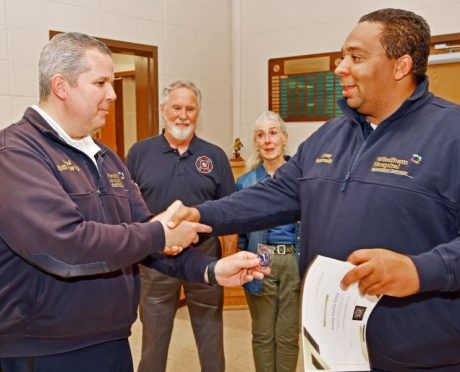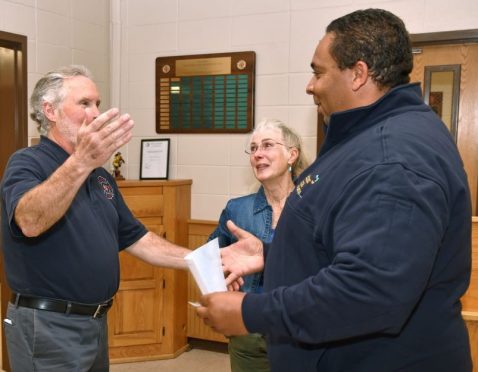“I remember thinking, ‘This is it. I’m going to die.’”
That was what Keith Herzig thought as he rode in a Columbia Volunteer Fire Department ambulance from his home to Hartford Hospital after suffering a heart attack on April 14.

The good news is that he lived to remember having that thought. He lived to say thank you to the firefighters, EMTs and Windham Hospital paramedic Corey Curtis-Gray last Wednesday night at the department’s regular monthly meeting. He lived because the Hartford HealthCare system of care connected Curtis-Gray to Windham Hospital emergency department physician Thomas Gilmore, MD, and together they decided the ambulance should bypass the local hospital and head straight to Hartford.
At Hartford Hospital he was brought immediately to the Catheterization Lab where he had three drug-eluting stents placed in his right coronary artery. After being placed into narrowed, diseased peripheral or coronary arteries, these stents slowly release a drug to block cell proliferation.
Discharged after only three days, the 66-year-old finished recuperating at home, and just began his cardiac rehab program.
He felt strongly about joining the first responders (and his care team from Hartford Hospital in a separate gathering) because –
“I know it’s their job. It’s their job to save me, and to take good care of me. But everybody was just exceptional. I can’t get over how well we were treated by all the doctors and nurses and everyone. And I wanted to say thank you.”
Retired after he sold his trucking company in 2015, Keith now works part time for his friend who owns Eric’s Tree Service in Columbia. On April 14, he had a busy day of driving around picking up equipment and bringing it to job sites. He doesn’t do any heavy lifting, just drives the truck.
At the end of that day, he was at a job site on Columbia Lake, about five minutes from his home. The crew loaded the equipment onto the truck, and Herzig got behind the wheel. “All of a sudden, it felt like someone hit me with a 2×4,” he said. “I was dizzy, nauseous, flushed, and I had a tremendous pressure in my chest. Not pain. Just pressure.”
Despite serving as a volunteer member of the fire department for many years, Herzig told himself he was just dehydrated after the busy, warm day. So he drove to where the equipment needed to be offloaded, waited, then drove to the company’s main office. He felt worse and worse. He drove to his house just down the road, and his wife was outside.
He couldn’t even climb the five steps from his garage to his house. He sat while his wife brought him some water and asked if she should call 911.
Instead, Herzig told his wife Shari to call a friend who is an EMT. That friend told them to call 911 immediately, and then the first responders began to arrive.

Because of his long affiliation with the department, Herzig knew everyone who was around him.
“I remember being in the ambulance, it’s all kind of fuzzy, but I was freezing cold and Corey got me a blanket. And the chief told me afterwards that it was only 24 minutes from my house to Hartford Hospital, and that’s pretty good. That’s fast.
“And I swear, at one point during that trip, I had, well, I guess almost had an out-of-body experience. I was looking down at myself on the stretcher and I was shaking and crying and that’s when I thought, this is it. I’m going to die. And I just felt this calm come over me. But then the next thing I was lying on the table in the hospital and you could see my insides on a big screen and they were putting a wire in my artery.”
Herzig admits that with all his years volunteering with the fire department, he should’ve known better than to put off calling 911. A full medical exam the week before hadn’t shown any issues with his heart, so he attributes some of his hesitation to that.
Paul Pedchenko, EMS Program Coordinator at Windham Hospital, said Herzig’s decision to delay calling 911 is not uncommon.
“We always say that if you are feeling chest pain, chest pressure or shortness of breath, you should always call 911 immediately,” Pedchenko said. “The saying is, ‘time is muscle.’ Your heart muscle is being starved of oxygen and blood, and the sooner we can get you to where you need to be to have that oxygen and blood flow restored, the better your recovery will be.”